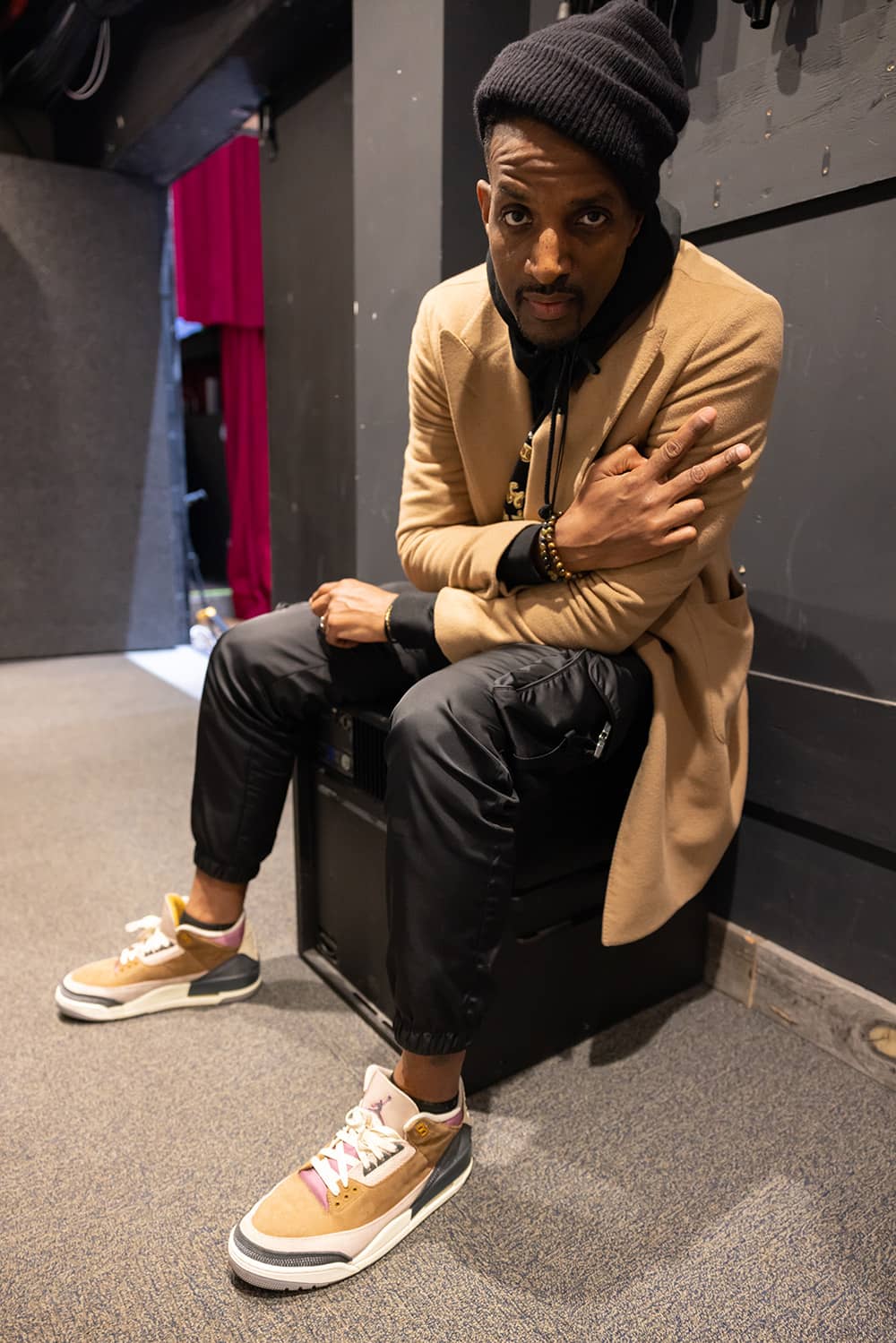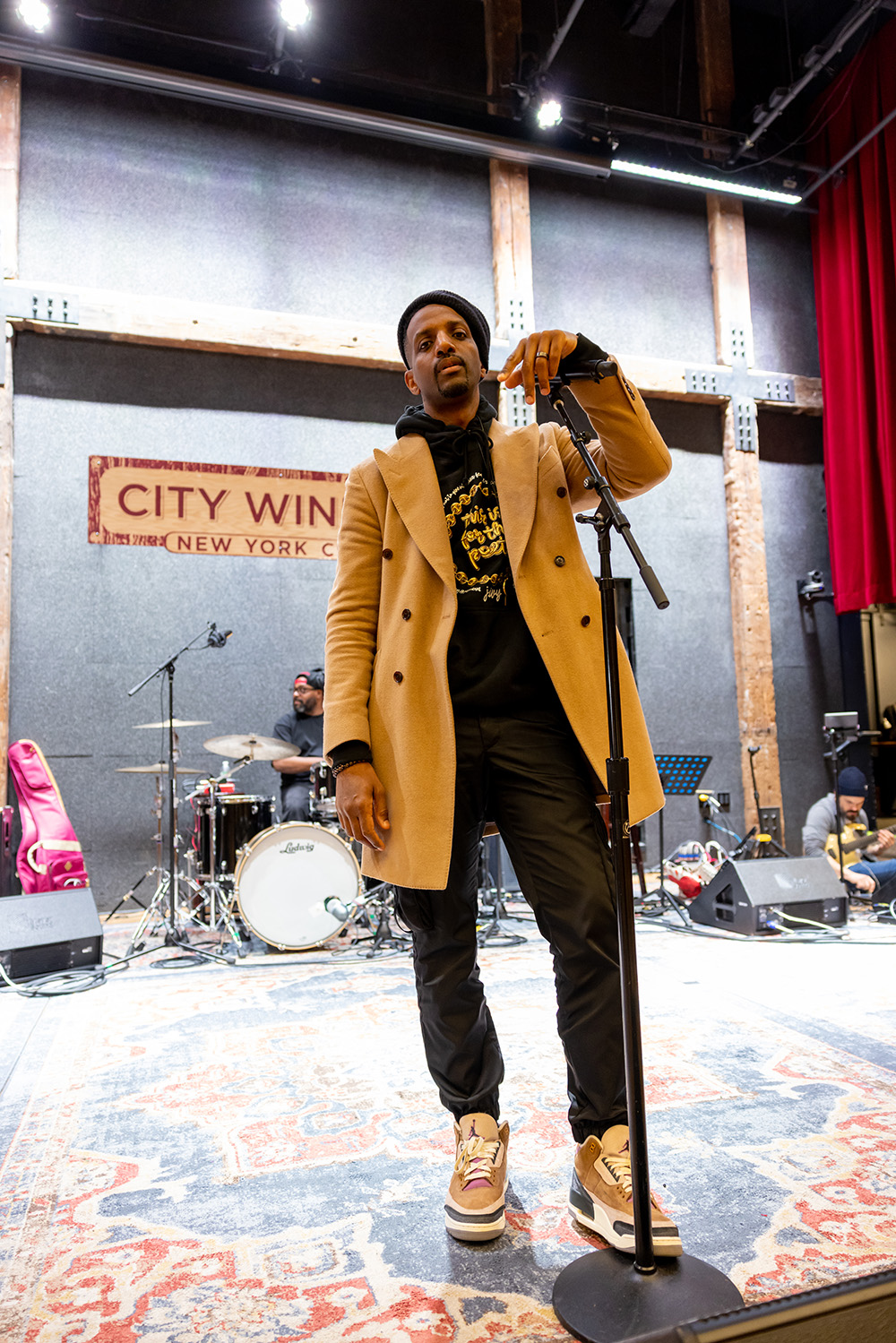J. Ivy
When J. Ivy meets new people, they inevitably ask, “What do you do?” and he tells them the truth: “I’m a poet.” But, and there’s always a “but” with creatives (writers, painters, poets), what they really want to know is what does he do to make money — because certainly poetry can’t be his actual career. His follow-up? “I write poetry.” After all, he is a GRAMMY-award-winning poet, author, and artist with four studio albums, has collaborations with the likes of Kanye West and Jay Z, and is the man responsible for naming superstar singer John Legend.
Poetry is more than a career and has done more than pay the bills. It’s how J. Ivy became a pioneer and history maker.
“You’ll hear all these different career paths, but poetry isn’t one that you hear all the time,” he tells SoundExchange. “So, to be able to say that and to stand in this space and have historic moments, be able to win a GRAMMY and help create a new category, it’s just amazing to me.”
 James Ivy Richardson II (J. Ivy), born in Chicago, got his first taste of poetry from his high school English teacher, Ms. Paula Argue. His assignment was to perform in a school show. But it was his mother who was the first one to tell him he had a gift. “She was my first publisher,” J. Ivy says.
James Ivy Richardson II (J. Ivy), born in Chicago, got his first taste of poetry from his high school English teacher, Ms. Paula Argue. His assignment was to perform in a school show. But it was his mother who was the first one to tell him he had a gift. “She was my first publisher,” J. Ivy says.
At Illinois State University, he became known on campus as “The Poet” and became a staple in the Chicago arts scene, infusing poetry with hip-hop. He was inspired by the guys he grew up with, other artists, comedians, and the people who continued to encourage him and cheer him on along the way. With hip-hop as the soundtrack to his life, it only made sense that his poetry would be influenced by the genre that spoke for a new generation in a way no other genre had.
“Hip-hop has always been a huge part of my life, my existence, my growth as an artist … before I had dreams of being an artist,” J. Ivy explains. “This was just me moving through life. And hip-hop was absolutely a soundtrack. The first record I ever brought with my own money was Gang Star’s No More Mr. Nice Guy. We create great music; we tell stories in a way that haven’t been told and the music is so needed and so necessary. So, I’m beyond proud to be a part of this village.”
Ivy became the first Black poet to represent Chicago on Russell Simmons Presents HBO Def Poetry. He collaborated with West and Jay Z on “Never Let Me Down.” He performed original poems for Michael Jordan and Deepak Chopra. He even wrote and narrated Beyoncé’s Black Is King promo for the 2020 return of the NBA. He has shared stages with the likes of Prince, Sia, Doug E. Fresh, Slick Rick the Ruler, Jim Carrey, Erykah Badu, Jill Scott, Mos Def, Talib Kweli, Common, Lauryn Hill, and Dave Chappelle. He has four studio albums, has written a book — Dear Father: Breaking the Cycle of Pain — has written for television, done voiceover work, and worked as Lead Writer, Voice Director, and cast member of the new Netflix film, jeen-yuhs: A Kanye Trilogy.
 Words To Live By
Words To Live By
There’s countless lyrics that has moved Ivy over the years — like Eric B. K Rakim’s “Move the Crowd” and Slick Rick’s “Children’s Story.” But he credits his own poem, “Dream Big,” as the words he lives by. “It just really epitomizes everything that I strive to be and become in life. It’s a two-minute poem, but should I do the poem?” he asks, before reciting it from memory.
… So climb the way you breathe and never stop inhale your best. Exhale the BS, keep on keeping on. See where you going and work on getting there. Don’t hate on others when others get theirs because you gone get yours. You gone knock down your own doors, know that God gone take care of you and yours.
SoundAdvice
Thirty years after his first performance, J. Ivy made history in 2023 as the first poet to win in the GRAMMY Awards’ new Best Spoken Word Poetry Album category for his latest release, The Poet Who Sat By The Door
“To walk in the footsteps of those like the Last Poets and Gil Scott Heron and Sonya Sanchez and so many greats, it’s incredible to represent. I was told that Dr. Maya Angelou is the only other poet that ever won a GRAMMY, so to know that I’m in that company is beyond humbling.”
It’s a testament to resilience, continuing to study your craft, and never giving up. There was no overnight success. His accolades are 30 years in the making. When he was a younger artist in his 20s, he wishes he wasn’t so hard on himself and had enjoyed his moments.
“This is advice I would give anybody, that I give everybody, just keep going, just keep going,” he says. “Me specifically, I would tell my younger self to not beat myself up, to be patient, to not stress because it takes away from the joy and the journey. The journey is all about enjoying every single moment as much as you can, at least.”
“I would just remind myself to have fun,” he adds. “No moment is too big to know that your gift will make room always, again, keep going. Stay positive, treat people good, and dream. Very, very big. Dream very big. I think sometimes we get caught up in what is possible. I would just remind my younger self there’s a blueprint of possibilities. And your job as an artist, as a creative, as a poet, is to continue to sketch that blueprint. The pen is in your hand. You have the power to create it and build it however you want it to be built out.”
